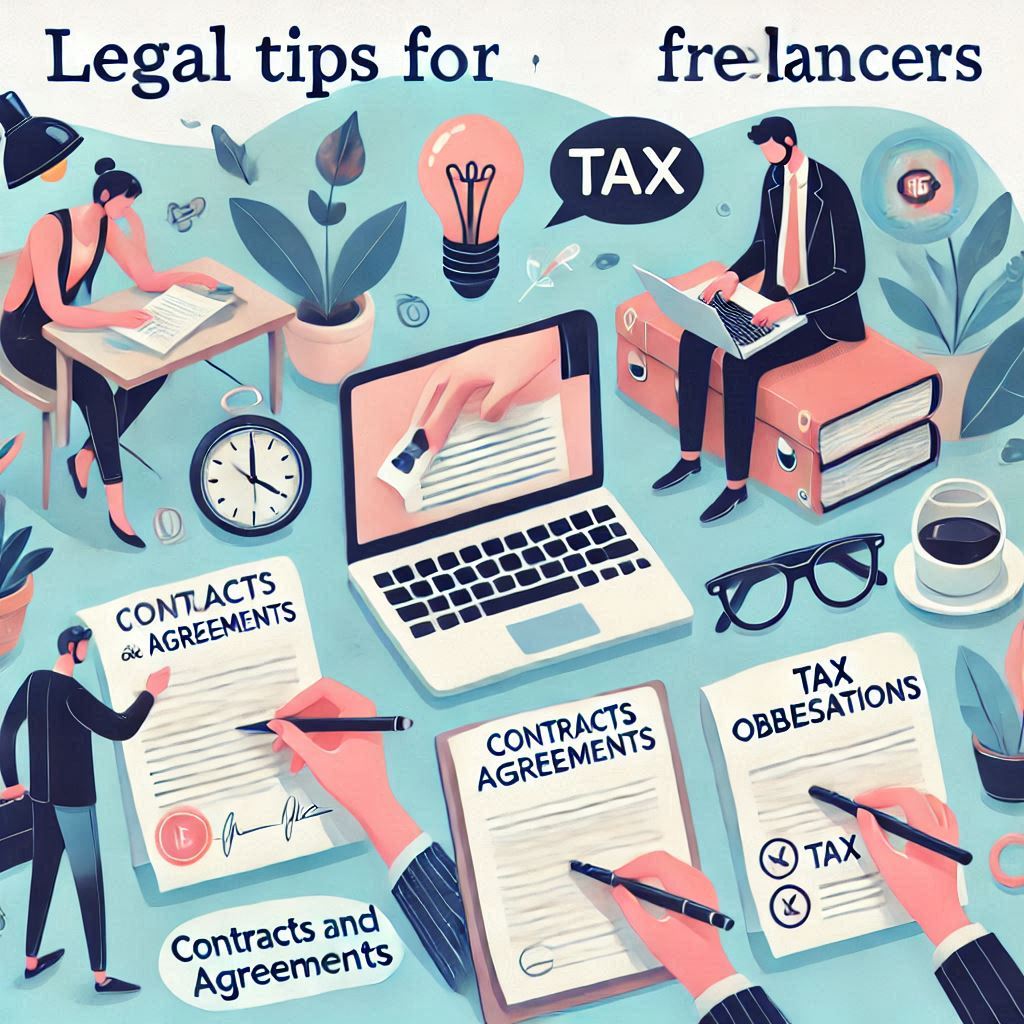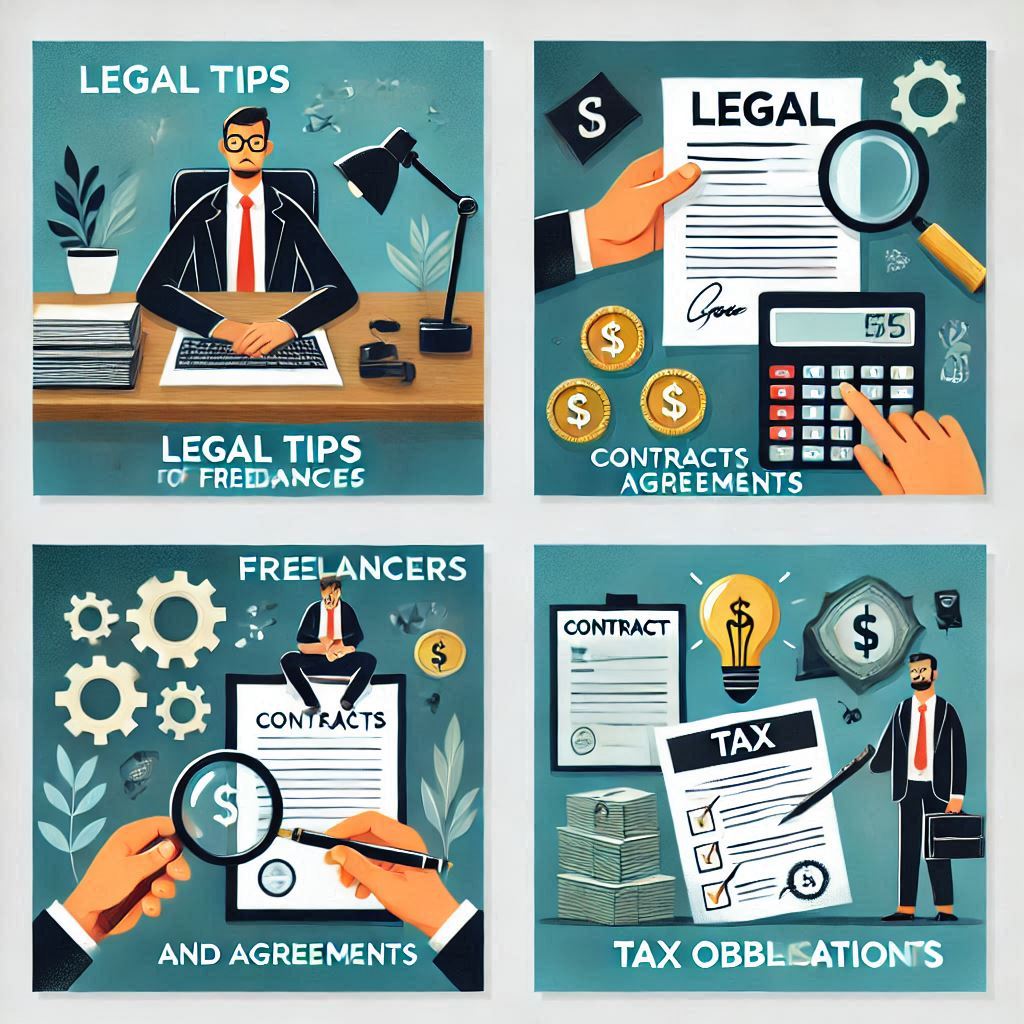Freelancing comes with a unique set of legal challenges that are important to understand. Legally, freelancers are considered independent contractors. This classification means that, unlike employees, freelancers are responsible for their own taxes, securing clients, and setting their work terms.
One major difference between freelancers and employees is the lack of traditional workplace protections. Freelancers handle their own benefits, taxes, and legal obligations. Recognizing these differences helps navigate the freelancing world more effectively.
Taking on these responsibilities means freelancers need a firm grasp of their legal obligations. This includes knowing your way around contracts, understanding tax liabilities, and ensuring compliance with any licensing requirements. It’s about being proactive in managing these elements to reduce risks and safeguard your freelance business.
Contracts and Agreements: The Freelancer’s Best Friend

For freelancers, contracts are basically lifesavers. They’re not just formalities but essential tools to protect you legally. Having a clear, written agreement with your clients sets the stage for a professional relationship. Without them, you could find yourself in murky waters if things go south.
A good contract needs to spell out the project’s scope, timeline, and payment terms clearly. This way, both parties know what to expect and what’s expected of them. It minimizes misunderstandings and provides a solid reference point if disagreements arise.
Creating enforceable contracts might sound daunting, but it’s crucial. Make sure to outline deliverables, deadlines, and payment schedules. It’s also wise to include clauses on revisions, termination terms, and intellectual property rights. These details can save you from a lot of headaches.
If you’re unsure how to draft an effective contract, consider investing in legal templates or seeking advice. There’s lots of resources available to guide you. It’s an investment in your business that can save future stress.
Tax Obligations: Navigating Self-Employment Taxes

Handling taxes as a freelancer can be a bit of a puzzle if you’re used to the simplicity of employee tax deductions. Freelancers fall under the self-employed category, meaning you’re your own boss when it comes to handling taxes.
Self-employment taxes cover Social Security and Medicare, which employers usually cover for traditional employees. As a freelancer, you’re footing both the employee and employer portions. This can take up a chunk of your earnings if you’re not prepared for it.
The good news? There are plenty of deductions to help ease your tax burden. Home office expenses, work-related travel, and even health insurance premiums can often be deducted, reducing your taxable income. Carefully tracking your expenses throughout the year can really pay off when tax season rolls around.
Staying compliant with tax laws means keeping organized records and possibly making quarterly tax payments to the IRS. Don’t wait until tax season hits to start piecing together your finance puzzle; being proactive saves time and hassle.
If taxes make your head spin, it might be worth reaching out to a tax professional or accountant familiar with freelancing. They can offer guidance tailored to your situation, helping you make the most of available deductions and navigate self-employment taxes with confidence.
Protecting Intellectual Property: Know Your Rights

Freelancers, your work is your bread and butter, so it’s crucial to know how to protect it. Intellectual property (IP) rights are there to ensure your creations and ideas aren’t used without your consent.
IP rights can seem complex, but at their core, they’re about legally guarding your creative efforts, whether it’s a design, written content, or a unique idea. Registering your work with copyright or trademark authorities can give you extra protection and legal backing if someone crosses the line.
Even without formal registration, you still have some form of protection. For instance, the moment you create original work, you have some copyright claims, but registered protection offers a clearer path for legal action.
Sometimes protecting your IP means being proactive, like keeping your work and concepts under wraps until they’re launched or ensuring your contracts include clauses about IP ownership and usage rights.
In cases where your IP is infringed, knowing when and how to take legal action is key. This might involve sending a cease-and-desist letter or escalating to legal proceedings if necessary. Having legal support or advice lined up can be invaluable in these situations.
Freelancer Insurance: Why You Need It

Freelancing comes with its share of risks, and having insurance can be your safety net. Without the benefits of traditional workplace protections, freelancers are on their own when it comes to handling unexpected issues.
Professional liability insurance is a top pick for many freelancers. It covers legal costs if a client claims your work caused them financial loss. This is especially important in fields where errors can lead to costly fallout.
General liability insurance is worth considering too. It protects against claims of bodily injury or property damage related to your business. For those working from a home office or meeting clients face-to-face, this can be vital.
Don’t overlook health insurance. Without employer-provided coverage, it’s up to you to find a plan that fits your needs and budget. There are marketplace options designed with freelancers in mind that might offer the coverage you need.
Choosing the right insurance means assessing your specific risks and needs. An insurance broker familiar with freelancing can be a great ally, helping navigate the various options and ensuring you’re covered where it matters most.
Licensing and Permits: Do Freelancers Need Them?

Freelancers often wonder if they need licenses or permits to operate legally. The answer depends on the type of work you do and where you live, as requirements vary widely based on industry and location.
Certain professions, like graphic design or writing, might not need specific licenses. However, if you’re in sectors like health, finance, or legal consulting, there are often strict regulations to follow. It’s crucial to research what’s required for your field to avoid any legal hassles.
Geography plays a role too. Some cities or states require freelancers to hold a business license even for general freelancing work. Checking local government websites or consulting with a small business advisor can clear up these requirements.
Taking the steps to obtain the necessary licenses and permits isn’t just about staying on the right side of the law. It also adds credibility to your business, signaling to clients that you are a legitimate operation.
Ignoring these requirements can lead to fines or shutdowns, affecting both reputation and income. Staying informed and compliant protects your business and sets you up for future growth.
Understanding Non-Compete and Non-Disclosure Agreements

Freelancers may encounter legal paperwork like non-compete and non-disclosure agreements, and it’s important to know what you’re signing up for. These agreements can have significant implications for your work and future opportunities.
A non-compete agreement restricts you from working with competitors or starting a similar business for a certain period after your contract ends. While not every client will ask for this, it can be a big deal if they do. Carefully consider how these terms could impact your ability to earn a livelihood.
Non-disclosure agreements (NDAs), on the other hand, are more common and generally less restrictive. NDAs ensure confidentiality, protecting sensitive information shared during your work together. They’re a standard expectation in many industries, especially when dealing with proprietary or insider information.
Before signing either type of agreement, it’s wise to fully understand the implications. Look into how long these agreements last and any geographical limitations they impose. If anything seems unfair or extreme, negotiate those terms with the client.
Consulting with a legal professional can be invaluable, especially if you frequently deal with contracts. They can offer insights on what’s standard in your industry and protect you from overreaching clauses that could harm your freelance career.
Addressing Client Disputes: Steps to Resolution

Dealing with client disputes is an inevitable part of the freelancing journey, and handling them effectively can make or break your professional relationships. Whether it’s a disagreement over project deliverables, timelines, or payments, the key is to address issues quickly and professionally.
Start by maintaining open communication lines. A simple misunderstanding can often escalate when clear communication is lacking. Address the issue as soon as it arises and be willing to listen to your client’s concerns. This approach not only resolves the current problem but also prevents future misunderstandings.
Keeping detailed records of all interactions and agreements with clients can be incredibly helpful if disagreements occur. Documentation serves as evidence of the agreed terms and can support your position during disputes. This highlights the importance of having those robust contracts we discussed earlier.
If the dispute can’t be resolved amicably, mediation is a viable option. Mediation services offer a neutral party to facilitate negotiations, helping both sides reach a fair agreement without resorting to expensive legal action. It’s often faster and less stressful than going to court.
Ultimately, protecting yourself from disputes starts with setting clear expectations and being proactive throughout the project lifecycle. Prevention, paired with professional conflict resolution skills, can maintain your reputation and keep your freelance business thriving.
Wealthy Affiliate: A Resource for Freelancers’ Success

Wealthy Affiliate can be a game-changer for freelancers aiming to boost their business acumen and ensure they’re legally sound. This platform offers a blend of training, tools, and community support that’s tailored for freelance professionals.
One of the standout benefits is access to comprehensive training modules. These cover a wide range of topics that can help a freelancer understand the intricacies of online marketing and client engagement, all while ensuring legal considerations aren’t overlooked.
Freelancers often struggle with establishing and maintaining a strong online presence. Wealthy Affiliate provides the resources to build a professional website, including domain hosting and design features that align with your brand image while keeping everything compliant with digital laws.
There’s also a supportive community ready to share insights and answer questions, offering a collective knowledge base to navigate freelance challenges together. If you’re grappling with how to manage contracts or need advice on a tricky client situation, this community can provide guidance borne from experience.
Utilizing Wealthy Affiliate helps you protect your work and grow your freelance business sustainably. It’s about having the right tools and knowledge at your fingertips to navigate the diverse legal and business challenges that freelancing entails.
Click here to read Wealthy Affiliate Review
Leave a Reply